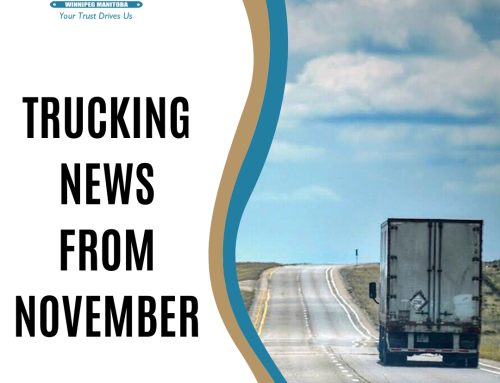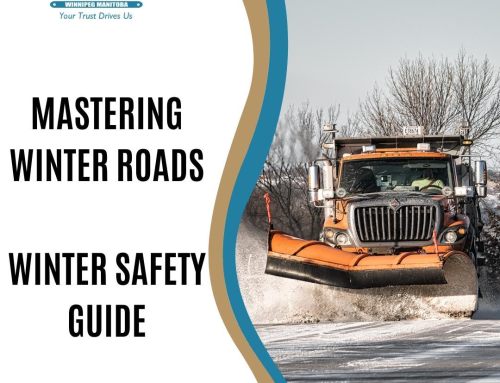 Trucking News
Trucking News
Where did 2022 go?! We blinked and seemed to have missed it. But as 2022 closes out it’s been busy in the trucking industry. No rest for the wicked I suppose.
We’ve collected the top trucking headlines and news all in one place. After all, you’re busy turning miles. Grab a cup of coffee and check out the trucking news you may have missed from November.
Trucking Safety
Truckers Call for Safe Parking at Women in Trucking Conference – “If you don’t have anywhere to park, you don’t have a place to use the restroom. It’s not easy for us like men. There’s an awareness you have to have. If you park at a truck stop, you need to be aware not to get yourself in a bad situation if you don’t know what’s lurking around,” Walmart driver Sheena Sweetwood reportedly said.
Ontario to clear snow faster from Highways 11, 17 – The provincial government says it is improving road safety in Northern Ontario by clearing Highways 11 and 17 four hours faster than the previous standard. The new “ON Trans-Canada” standard requires contractors to clear the highways to bare pavement within 12 hours of the end of a winter storm.
CTA Asks Human Trafficking Detection & Prevention Be Included in Truck Driver Training – “With tens of thousands of truck drivers going through training each year to obtain their licences, it’s a perfect place to start having an immediate impact on the number of drivers who are trained to be vigilant and have that extra sets of eyes out on the road to help put an end to human trafficking,” said Geoff Wood, CTA Sr VP Policy.
Iowa rest area to close for the winter, will reopen in April 2023 – Starting at 9 a.m. on November 14, 2022, Iowa DOT will close the rest area located on southbound I-35 at mile marker 51 in Warren County near St. Charles.
90 truck parking spots part of new Love’s along I-90 in northeast Ohio – The store, located off Interstate 90 (1601 Great Lakes Way), includes 90 truck parking spaces.
B.C.’s Shifting into Winter campaign focuses on safety – The Shift into Winter campaign, supported by the Winter Driving Safety Alliance, reminds trucking employers they are legally responsible for the safety of their employees when they drive for work. This applies to full-time, part-time, and occasional drivers – including employees such as office staff who may make work-related trips.
Trucking & Infrastructure
Even public officials have no idea how California’s infrastructure would support mandated electric semi trucks, public hearing reveals – Currently, there are less than 90 electric semi trucks on California roads and only 1,943 medium and heavy-duty electric vehicles. If passed, the rule would add 510,000 electrified medium and heavy-duty trucks to California roads in 2035, 1.2 million in 2045, and 1.6 million in 2050. Currently, it is believed that the state would need to install approximately 800 chargers per week to power electrified truck fleets, with 64-158 megawatts of charging capacity.
Truck stops will soon need the same amount of power as a small town if electrified rigs continue, study shows – A new study conducted by National Grid Plc. has found that projected highway charging requirements will skyrocket in the next few years thanks to the introduction of more electrified cars and semi-trucks. The study estimates that electrifying a typical highway gas station will require as much power as a professional sports stadium by the year 2030. By 2035, a big truck stop serving electric rigs is expected to require as much power as an entire small town.
Pilot and Volvo announce plan to build charging network for electric semis at truck stops – Pilot and Volvo company leaders signed a letter of intent to partner to develop a charging network open to all battery-electric Class 8 truck brands, according to a November 15 news release.
Trucking Regulations
Colorado DOT warns of temporary road closures for blinding sun this season – The Colorado Department of Transportation says this problem is the most common in November and causes the most issues on Interstate 70 – particularly in the eastbound lanes during morning hours near Floyd Hill. The four-mile stretch of roadway between exits 244 and 248 east of Idaho Springs experiences intense glare from the sun from sunrise until about 8:30 a.m. from November through February. Those looking to travel the area should expect slowed traffic and potential closures resulting in detours for the next few months.
MTO Focusing Enforcement Efforts on Wheel Inspections – “Vehicle and driver operating safety is priority number one in the trucking industry,” said OTA president and CEO Stephen Laskowski. “OTA will continue to work with MTO to make our industry and public highways safer, including matters involving wheel inspection safety.”
Over 4,600 CMVs placed out of service in U.S. during Brake Week – Commercial motor vehicle inspectors in Canada, Mexico and the U.S. conducted 38,117 inspections of commercial motor vehicles Aug. 21-27 for Brake Safety Week. Of the total number of commercial motor vehicles inspected, 13.3% were placed out of service for brake-related critical vehicle inspection item violations. That also means that nearly 87% of the commercial motor vehicles inspected throughout North America during Brake Safety Week did not have brake-related critical vehicle inspection item violations.
Federal regulators propose fines for Hours of Service, ELDs – “If an individual is both a driver and a motor carrier, they could be subject to pay the applicable fine as a driver and the applicable fine as a motor carrier,” Transport Canada adds in a document about the related consultations, referring to the trucking industry’s independent contractors.
ELD rules to see mixed enforcement on Jan. 1 – Federally regulated carriers – as well as carriers that work exclusively within the borders of Newfoundland, New Brunswick, Ontario, Manitoba, and Yukon – will have to use electronic logging devices (ELDs) as of Jan. 1. But plans in other jurisdictions vary.
CTA: Feds Target Driver Inc. in Fall Economic Statement – The Economic Statement notes “there is a long history of companies using the misleading “Drivers Inc.” practice, whereby drivers are encouraged to self-incorporate and operate as independent contractors without being provided information on the downsides of the practice. By not classifying drivers as employees, companies are denying them access to important rights and entitlements under the Canada Labour Code, such as paid sick leave, health and safety standards, employer contributions for Employment Insurance and the Canada Pension Plan, and provincial or territorial workplace injury compensation.”
Feel Good Trucking
A website compiles a list of the country’s best truck stops for their food – A website dedicated to all things food-related just announced its list of the best truck stop food in each of the 50 states. In its presentation, the website says, “… if you skip the chains, there are some real unexpected food treasures to be found.”
Survey shows national respect for trucking is high – Throughout mid- and into late-2020, truck drivers and fleets saw a surge in respect and appreciation because, tagged as an essential business, consumers saw – some for the first time – just how all the things that fill their pantries and refrigerators get to the grocer, and that trucking couldn’t take the pandemic off because, frankly, we’d all starve to death.
Abacus Poll: Trucking Viewed as Most Important Mode in Canada – Just over half of Canadians (51%) surveyed consider trucking the most important mode to get goods delivered across Canada – much higher than rail (19%), air (18%) and marine (13%). Three in four Canadians (76%) believe trucking to be either the most or second most important mode in getting goods to market.




